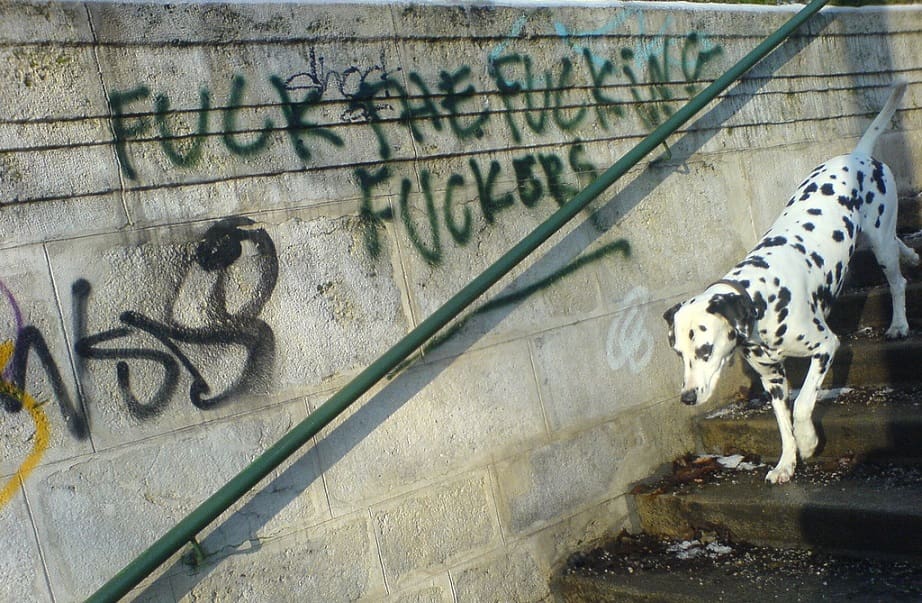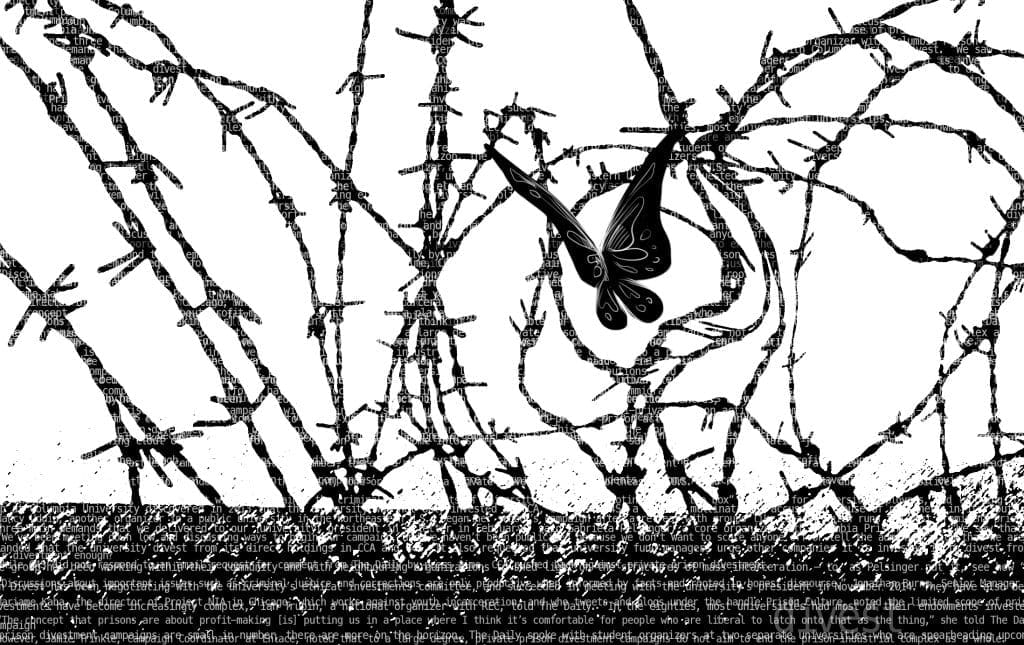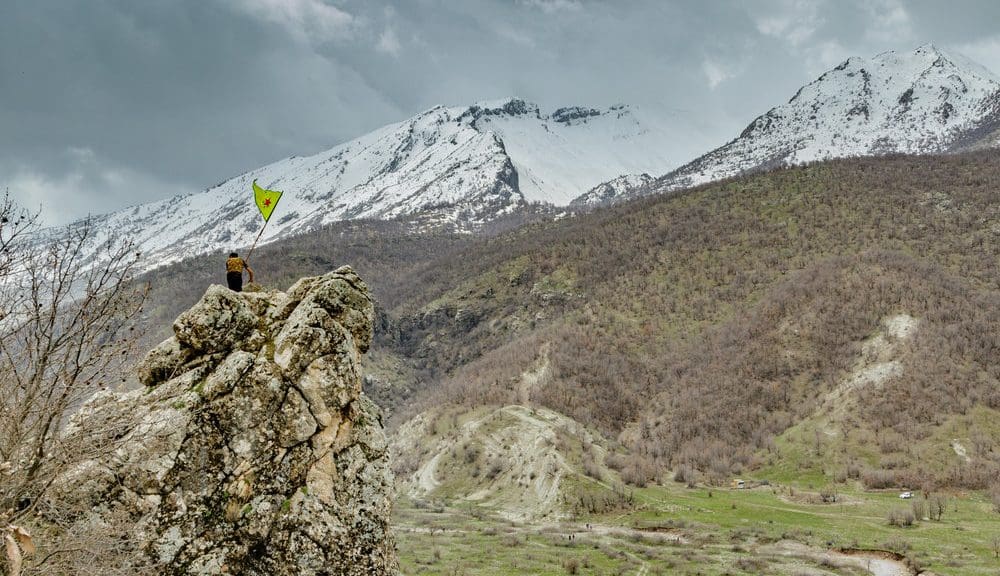Transcribed from the 30 April 2016 episode of This is Hell! Radio and printed with permission. Edited for space and readability. Listen to the whole interview:
There is, within activist culture, a propagation of behaviors that people in their hearts know will not result in a revolution, because they’re actually afraid of revolution. There’s an industry (I call it the protest industry) that propagates ineffective protest in America and in other countries.
Chuck Mertz: In the weeks before the invasion and occupation of Iraq, millions of people around the world took to the streets to protest the pending war. At the time, antiwar groups said it was the biggest mass protest in history. Millions more signed online petitions to declare their opposition to the war, and with all that force and energy of activists, we actually stopped the war in Iraq.
Wait, what? We didn’t? The war went forward despite millions of people marching against it? Despite all those online petitions they signed?
Here to tell us what’s wrong with protest and how we can make it right, award-winning activist Micah White is the author of the new book The End of Protest: A New Playbook for Revolution. Welcome back to This is Hell!, Micah.
Micah White: Thank you, Chuck.
CM: You write about the success Occupy enjoyed: “For a few magical weeks in 2011, peoples’ encampments sprung up in 951 cities across 82 countries.” Being that there are only 196 nations in the world today, that means nearly half of them had an Occupy. What did those nations have in common? What experience do you think those people in 82 nations, in 951 cities, shared that created fertile ground in each place for an Occupy encampment?
MW: At one level it’s a signature of the fact that we live in a world where no matter where you live you’re basically oppressed by the same enemy, which is the power of money over democracy. As the recent Panama Papers leak revealed, it doesn’t matter if you’re living in Pakistan, the UK, the US, or Russia. You’re facing the same enemy, which is the hyper-rich who use their money to control governments while at the same time hiding their money from the taxman.
That is the political analysis. But the deeper issue here is that humanity has been trying to rise up for thousands of years. We have records, going back to ancient Egypt, of people overthrowing kings. When a new kind of social movement arises, people actually believe it’s going to win. That’s the important thing: that for a brief moment, people actually believed Occupy was going to fundamentally change the world. So we saw everyone rush to join it. Occupying became the way that we protested.
That’s basically what happened. If we are able to create something that people truly believe is going to win, then people everywhere will run to it and use it as a way to express their own local discontents.
CM: You write that Occupy Wall Street was a “political miracle.” How so? And can something be a miracle and not be a success? There are many who say Occupy “failed.” Is the mere fact that it occurred make it a success unto itself?
MW: There are two really important parts to that question; one gets at what the nature is of these political miracles, these rupture moments that seem to come out of nowhere, and the second is whether Occupy was a failure or a success.
Starting with the second question: a lot of people like to say that Occupy Wall Street was a success. There is a common narrative within activism that Occupy didn’t fail, it merely splintered into a thousand shards of light. And it changed the discourse! Look at Bernie Sanders! Now everybody knows about the 99%!
But I call Occupy Wall Street a constructive failure. I think Occupy Wall Street failed to achieve its revolutionary agenda. It didn’t get more political power for the 99%; it didn’t jail the bankers or get money out of politics. It’s a constructive failure that revealed the limitations of our contemporary notions of activism and our contemporary theories of social change.
I think it’s good and productive to think of Occupy Wall Street as a constructive failure. I think that revolutionaries in the past would look at the Paris Commune or the uprisings of 1848 or the failed revolution of 1905 in Russia, and they would see those as constructive failures that they learned from in order to get towards their successes. If we’re unwilling to do that, then we don’t reach towards our success.
Then there’s the first question, though, about the political miracle: I think it gets at the heart of why Occupy Wall Street grew so big. Think back to 2011; were you to ask the average American—at Adbusters we asked David Graeber whether or not a revolution is possible in America. And he said no, it’s not possible. This was just a couple months before Occupy Wall Street. And that was the feeling on the street from a lot of activists. They thought the revolution can’t come to America, it’s not possible. Kind of like how we feel today, in fact. But then it did happen.
I call it a political miracle because it gets at the heart of what truly revolutionary moments are. They are always surprising, they always “come out of nowhere,” they always seem to do the impossible. That was amazing about Occupy.
CM: So you recognize the constructive failures of Occupy. You’ve thought about it, you’ve analyzed it; you’re one of the co-creators of Occupy Wall Street, and you realize the constructive failures. What explains why it has taken so long, and a lot of people still haven’t learned the lesson of the constructive failures of marches and parades and online petitions?
MW: On the one hand, activists themselves are actually afraid of revolution. A lot of activists have started to believe that revolution isn’t possible—and that it’s not even desirable, quite frankly, and they don’t actually want to succeed with the actions that they’re doing. This is one of the key things. A lot of people protest, but they don’t actually want to become the government, or topple the government and then replace the government with themselves, because that’s terrifying for them. But that’s what a real revolution would be. There is, within the activist culture, a propagation of behaviors that people in their hearts know will not result in a revolution, because they’re actually afraid of revolution.
That’s one reason. Another part of it is that it’s very hard to get any detachment, because there’s actually an industry (I call it the protest industry) that propagates ineffective protest in America and in other countries. To say it quite plainly: we saw that quite recently with Democracy Spring, which was another scripted protest where people did synchronized arrests, where they worked with the police department beforehand, all that kind of stuff. I think these events are being created to prevent other revolutionary uprisings from happening.
CM: Petitions and marches make us feel like we’re doing something rather than nothing; while we might not have time to participate in an encampment like Occupy, we can fit a petition-signing into our busy day or we can participate in a march for an hour or two on the weekend and then go home, and go back to work the next day.
But in a sense, is doing nothing better than enabling this kind of failed protest strategy?
MW: The dominant theory of social change basically says that human action creates change, so if we want to change the world we need to get into the streets, we have to do direct actions, we need to do things—this kind of activism would reject the idea that doing nothing could somehow actually change the world.
If you think about it from an activist’s perspective, a lot of us have been activists long enough that we realize we can only really have one big activist event per year. This is a strange thing I’ve noticed. We can have the People’s Climate March, and that’s it. Or we can have Occupy Wall Street, and that’s it. Or we can have the antiwar march in 2003, and that’s it. We can basically have one big thing, and then that’s where all the activists pour their energy, and if it works, great, and if it doesn’t, then you’re bust. We have to stop wasting our time around these kinds of events that are ineffective, because we only have one shot at it. That’s the problem here.
Fake protest is underpinned by the idea that our actions don’t need to be illegal, that we can get permits from the government, that we can have “free speech zones” or we can do scripted arrests; it doesn’t need to be illegal or dangerous or disobedient. I think that’s completely misguided. The legal regime doesn’t matter when you create a protest. You operate outside of the law. Real protest is always illegal.
CM: You quote Edward Snowden commenting on the limits of the conception of protest at Occupy, saying, “Occupy Wall Street had limits because the local authorities were able to enforce, in our imaginations, an image of what proper civil disobedience is: one that is simply ineffective.”
To what degree are effective acts of civil disobedience criminalized? And are all legal protests ineffective ones?
MW: This is something that it’s hard to talk about, but the fact of the matter is that revolution is always illegal. The definition that I like to use for revolution is that it’s a change in legal regime. It’s switching who has the sovereignty to make laws. That change in legal regime is always illegal, by definition. In the same sense, protest that tries to get a change in legal regime—whether it’s in Egypt or the United States of America or Pakistan or the UK or Russia—if it’s trying to get a regime change, it’s an illegal behavior.
This is fundamental. All effective forms of protest are illegal until they succeed. All revolutions are illegal until they succeed, and then they become the government and all of the sudden these people are celebrated as heroes and all that kind of stuff. What we’re talking about is very real. This is what distinguishes fake protest from real protest. Fake protest is underpinned by the idea that our actions don’t need to be illegal, that we can get permits from the government, that we can have “free speech zones” or we can do scripted arrests; it doesn’t need to be illegal or dangerous or disobedient. I think that’s completely misguided. We didn’t get a permit for Occupy Wall Street. We asked people to bring tents knowing that it was illegal for people to set up tents. We did these behaviors because the legal regime doesn’t matter when you create a protest. You operate outside of the law.
It doesn’t mean they have to be violent. There are lots of different ways to be illegal. But it does mean that you have to say, “I’m trying to change a situation that is so important that I will disobey the law. My protest stands above the law.” And you also have to accept the consequences of that. For Occupy Wall Street seven thousand people were arrested. That’s an astounding number. People had their bones broken. People lost their jobs.
Absolutely. Real protest is always illegal. For sure.
CM: In 2000, when the Bush-Gore debate was going on over who had won the election, I remember seeing Tom Brokaw on TV saying “we’re so lucky to be in a country where we allow these kinds of protests,” while at the same time not pointing out that many of the protesters were hand-picked Republicans who had been sent down there to close down voting facilities.
Do we have the right and freedom to assemble, speak our minds, and protest in the United States, but we do not have the right to hold protests that could actually cause real social change?
MW: This is the crux of the issue. I called my book End of Protest. But the end of protest doesn’t mean the absence of protest. On the contrary, the end of protest means the proliferation of ineffective protest. We live in the time of the largest and most frequent protests in human history, so I’m not saying that there aren’t protests happening. What I’m saying is that what we call protests aren’t actually protests. They are some other sort of behavior.
In America we can create any sort of mass spectacle: you can bang on pots in the street, you can make noise, you can do anything you want as long as it doesn’t actually register as a threat to the US government or to the status quo. Once it becomes a threat, then you are shut down mercilessly, and immediately. This is what we saw at Occupy Wall Street. They shut that thing down. People remember that. They brought in the riot cops; they brought in the sound cannon; they shut it down.
We have to figure out how to create new and effective forms of protest that aren’t just performance pieces, which is what a lot of activism has become.
CM: You write that the “first step toward creating positive social change is to take responsibility for the failure of the protest-protest-protest paradigm. This process begins from the acknowledgment that contemporary protest is broken, and the willingness to fix it.”
Is protest-protest-protest “too big to fail” for establishment activist organizations? I’m trying to figure out if we need to quit individually participating in this broken paradigm or if the problem is the bigger activist organizations themselves and their insistence on continuing the broken paradigm.
MW: I think it’s both of those things. There is, as you’re saying, this activist establishment, this protest industry, these large “activist” organizations that rely on broken forms of protest in order to gain publicity for themselves, in order to build their email lists, in order to get donations. They have to do these kinds of behaviors, otherwise they would wither and die.
That’s why Occupy Wall Street, quite frankly, did not emerge from any of the established activist groups in America. That’s something people should really think about. Earlier in 2011 there were protests on Wall Street. Someone did a march on Wall Street just a couple months before Occupy Wall Street broke out. It was a complete failure, because it was a march. But still, an activist group in America did call for one. There were a couple dozen people; I don’t know who showed up, I’m just saying.
So on the one hand we do have these large activist NGOs whose very livelihood depends on propagating these broken behaviors, behaviors that they know won’t threaten the government, and my dark perspective is that some people in these large NGOs might even be working for the government, for all we know. That has happened in the past.
What is an individual activist supposed to do in this situation? We tend to think that we need to join large coalitions in order to have success; this is a common paradigm within social activism. We need to get the biggest possible coalition and work together to create the biggest possible march. But there was a study done in the 1970s that found that social activists who don’t coalition have just as much success as social activists who do. What I take this to mean is that as an individual activist or as small groups of activists, we can just let the fake activist NGOs do their thing, do their fake protests. Let’s just ignore them. Let’s suck away their members, let’s keep chipping away at them, let’s keep telling people that they’re doing ineffective and broken forms of protest. Let’s let them do their thing—just don’t coalition with them. Don’t sign on to their things. And build your own stuff on the side. Experiment. Do new forms of protest. Import new forms of protest from abroad. Do experimental stuff in your city, and try to get something that sparks.
We’re never going to be able to stop groups like Democracy Spring and Greenpeace and Avaaz from doing their fake protests. But what we can do is start to chip away at their following. We can help other activists realize that these groups are not helping, and are in fact quite dangerous.
CM: You write how you and Kalle Lasn “assumed that the United States would be unable to use force against nonviolent democracy protesters without eventually capitulating to our demands, because the eyes of the international community would be on our political performance. But the faith that brutal repression of dignified Occupiers would backfire against the United States proved to be wrong.”
Were you surprised that there wasn’t much uproar over the police crackdown, over the violence against Occupy? And in your opinion, why wasn’t there much of an uproar? What does that say about the US?
MW: I think the useful thing about Occupy Wall Street is it tested a whole series of hypotheses that have been dominant among social activists—that I believed, that Kalle believed, that a lot of people believed. One of those theories was that if you do an event where the protesters are so dedicated that they withstand police repression, then the government will have to listen to them. They will realize this is an authentic spirit among the people. That turned out to be not true.
I was very surprised. It was brutal. Someone did a Freedom of Information Act request on complaints made against the city of Oakland police department around Occupy Oakland. People had their knees broken, got stomped on their backs; police would find them in alleyways and beat them up. Extreme stuff, backed by evidence. And it was widespread. There was an article with people talking openly, saying, “They were breaking our bones in order to stop our movement.”
It was very surprising—and at the same time Obama never publicly mentioned the movement until it was evicted from Zucotti. So what’s going on here is there is a double standard. Western governments will use the presence of protest abroad in order to justify their preexisting political agenda. If they see large numbers of protesters in Egypt, they’ll say, “Hey, Mubarak, you’d better step down; look, your people are rising up.” But if the exact same protest behaviors are being done in their country, in America for example, there’s no force that says, “Hey, Obama, you need to listen to your protesters.” The UN won’t say that; there’s no greater political authority that says you need to listen.
But I think it’s good that it shattered that myth. We don’t have to keep repeating these same behaviors, then.
This idea that only a really bad situation will cause the people to rise up is a very flawed theory of social change. People join social movements because it gives them a feeling of losing their fear. They don’t join social movements out of fear.
CM: In January we spoke with Jodi Dean, author of Crowds and Party, about how we move from an inert mass to organized activists. Jodi quotes a speaker at Occupy Wall Street, on 15 October 2011, saying “We can take this park. We can take this park tonight. We can also take this park another night. Not everyone may be ready tonight. Each person has to make their own autonomous decision. No one can decide for you. You have to decide for yourself. Everyone is an autonomous individual.”
Jodi then adds in her book, “The mood was broken. The next few speakers also affirmed their individuality. We were no longer a we, a collective asserting ourselves as individuals. We became individuated, concerned first with our own particular preoccupations. Collective strength devolved into the problem of individuals aggregating by choices or interests that may or may not converge. Reducing autonomy to individual decision, we destroyed the freedom of action we had as a crowd. Occupy Wall Street foundered against a contradiction at its core. The individualism of its democratic anarchistic horizontalist ideological currents undermined the collective power the movement was building.”
In your opinion, how much of a role did individualism play in any failure that Occupy may have experienced? Because individualism is definitely something that we really embrace here in the United States.
MW: The way I would look at it is from the angle of horizontalism. Again, in every protest, in every social movement, we’re testing a hypothesis about social change. We were testing hypotheses at Occupy Wall Street; one of the hypotheses we were testing was leaderlessness, horizontalism. The way I parse out the problem of individualism versus collectivism is to say we were practicing horizontalism incorrectly.
One of the negative things that happened was we started to believe that if this is a horizontal movement and everyone is equal, then no one is better than me, no one has any more knowledge than me, no one has any better strategy than me. You get to this position where the whole group gets pulled down to the lowest common denominator: some guy who’s never protested before in his life, perhaps is working for the police, or maybe he’s on drugs—we don’t know. Who is this guy? He shows up and has just as much say as someone who’s been studying revolutionary history for twenty years and has been waiting for this moment. That gets at what Jodi’s talking about, which is that we fractured ourselves into these isolated individuals rather than seeing ourselves as a collective social movement.
Rather than pulling ourselves down, it’s a question of seeing how we can pull ourselves up. Instead of saying “there’s no one above me,” we need to say, “there’s no one below me.” So we talk as equals, but at the same time we recognize that some people have gotten to higher levels of understanding about economic matters (for example), and we should listen to them or at least heed their advice.
Social movements work when they give us that collective experience, like we’re part of something that is going to win. The mood of it makes us lose our fear. When we pull down into our own individual concerns we start to get afraid again, we start to get egotistical again. These things are the death of the movement.
CM: You told the interviewer on the CBC show The National that Black Lives Matter learned the wrong lesson from the failure of Occupy Wall Street. What was the wrong lesson that Black Lives Matter learned from the failure of Occupy Wall Street?
MW: This is one of those touchy areas. It’s very difficult. I’m black, so obviously I support Black Lives Matter. But the key thing, it seems to me, that Black Lives Matter learned was that Occupy wasn’t disruptive enough. “We need to be more disruptive. If we want to stop things, we need to block traffic. We need to disrupt things.”
We’re seeing this ideology of disruption with Trump: “If we want to stop Trump, we need to disrupt his rallies all the time.” But at the end of the day, Occupy Wall Street was plenty disruptive. We blocked a lot of traffic. We blocked lots of things. We mic checked lots of politicians. We used the idea of disruption very effectively in our movement.
The real lesson of Occupy Wall Street is that activism needs to be oriented around the very specific goal of gaining sovereignty, which frankly means if the people want something, they get it because they are the sovereign power. They’re not asking someone else to do something. So in Black Lives Matter we’ve gotten ourselves into a situation where we’re asking for the police killings to stop; we’re asking for these police to be punished. Well, we’ve seen it: none of the police have been punished. The police killings have not stopped. In fact, they just shot and wounded another person on the anniversary of the Freddie Gray killing in Baltimore. We know that these things are still happening.
So how does Black Lives Matter get to the position where it ends police killing? The only way to do that is to become the force that controls the police, the force that is the police. That’s a whole different challenge. That’s a whole different thing. That’s a scary thing. What would a police force that’s controlled by a social movement look like? What would a police force that’s controlled by Black Lives Matter look like? It gets back to this question of whether we’re willing to become the ones in power. Or are we content just to complain about the situation?
We need to stop complaining, and start to become the ones in power, even to the degree of going into dangerous territory, which is: how many Black Lives Matter activists are actually willing to become the police commissioner, or willing to become the police in their communities? That’s a scary thought. But that’s where we need to go.
Social movements need to own our cities. We need to own our police. We need to own our legislature. We need to own all the structures of sovereignty.
CM: Alex Cockburn used to tell me this all the time: we need to have the worst people in office. Vote for the worst possible people, because then we’re going to have a revolution. Do we need to boycott an election? Maybe have a Donald Trump as president—is that what we need in order to light new change?
MW: Back in 2011, the 15 May movement was in the streets in Spain; they had encampments everywhere, hundreds of thousands of people in the streets doing their general assemblies. And they did say, “You don’t represent us! We’re not going to vote! We don’t believe in the electoral system!” Then of course the right wing got into power. And I do think that was a major impetus now for Podemos to rise up, and now that they are engaged with the political process, they are winning.
But it’s defeatist logic that says first we need to lose and then we’re going to win. That’s a really dangerous thing to say, because we don’t know how grave the defeat could be. On the one hand, I personally am not voting. I think it’s important only to vote with your heart, and none of these candidates truly inspire me. But on the other hand I don’t wish for Donald Trump to win.
Instead what we need to do is build a social movement that can win elections. This idea that only a really bad situation will cause the people to rise up is a very flawed theory of social change. People join social movements because it gives them a feeling of losing their fear. They don’t join social movements out of fear. What will happen, if people get fundamentally afraid, is a withdrawal from social movements, not an increase in social movements.
What I’m trying to get across to American activists is that there is still time to fundamentally influence the US presidential election. It only took ten weeks to call for the birth of Occupy Wall Street. We could see a movement arise two months before the election that’s only initiated in July, for example. There’s still time to fundamentally change and swing the election. But we have to orient around that goal. We have to talk openly about that goal. We have to create that goal, and figure out what kinds of tactics we have to use in the streets, how we can make it work. That would be an exciting direction for activism.
CM: Micah, it is always a pleasure speaking with you on our show. Thank you so much for coming back on This is Hell!
MW: Thank you Chuck, it was awesome.





